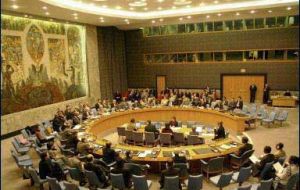MercoPress. South Atlantic News Agency
Argentina turns down Kosovo fearing Malvinas claim impact
 UN Security Council cannot agree on the International Legality of Independent Kosovo
UN Security Council cannot agree on the International Legality of Independent Kosovo Argentina will not recognise the newly independent Kosovo fearing this could have an undesired influence in the country's dispute with Great Britain over its unflagging Malvinas/Falkland Islands sovereignty claim, according to Wednesday's Buenos Aires press.
However, Clarín states that the Casa Rosada (Government House) will make no explicit declaration on the "thorny" issue. So far United States has recognized Kosovo, UK has named an ambassador to Pristina (David Graeme Blunt) but Russia, China and Spain among others refuse point blank to accept the independence of the disputed Serbian province. "Argentina voted in support of UN Resolution 1244/1999, drafted to orientate negotiations following the fall of Serbian Premier Slobodam Mirosevic, after the NATO air raids in reprisal for the ethnic cleansing practised against Albanians in Kosovo", said Argentine Foreign Affairs minister Jorge Taiana. The UN Security Council at which time Argentina was a non permanent member, "pronounced itself in favor of the principle of territorial integrity", underlined Taiana, and furthermore resolution 1244 clearly specified that any result out of the dispute must necessarily involve "an agreement or negotiation of the sides". Abiding by the principle of territorial integrity and negotiations and agreement between the sectors involved when faced with a sovereignty dispute, is part of the Argentine strategy in "its difficult relation with the UK since the military defeat of 1982". According to Clarín Kosovo's population is 90% Albanian and have been living there for several hundreds of years before the Serbs' migrations, a fact which apparently has been historically proven. "And this is one of the elements in Argentina's claim over the Malvinas since all along Argentina has argued that Islanders are not original from Malvinas but were transplanted by a colonial power, in this case the United Kingdom" . "However the situations are not comparable", points out the head of Argentine diplomacy, but since Kosovo is a "slippery issue", Argentina will adopt a "prudent attitude" and quietly join the group of countries that are not willing to recognize the newly independent territory. Spain is another country that has adopted a similar stance, but with a more delicate situation given the independence claims from the Basques, and other regional autonomies, plus the peculiar situation of Gibraltar, under British rule since 1713. Overall the Kosovo experience is "not positive for Argentina's Malvinas claim", as it is for the Basque conflict, Gibraltar, Turkish Cyprus, Hungarian speaking population in Romania and other minorities spread throughout Europe. Finally Clarin recalls that the Kosovo independence was decided on the margin of the United Nations, a unilateral decision from the Kosovo government, encouraged by United States and other European powerful countries such as Germany, France, UK and Italy.




Top Comments
Disclaimer & comment rulesCommenting for this story is now closed.
If you have a Facebook account, become a fan and comment on our Facebook Page!